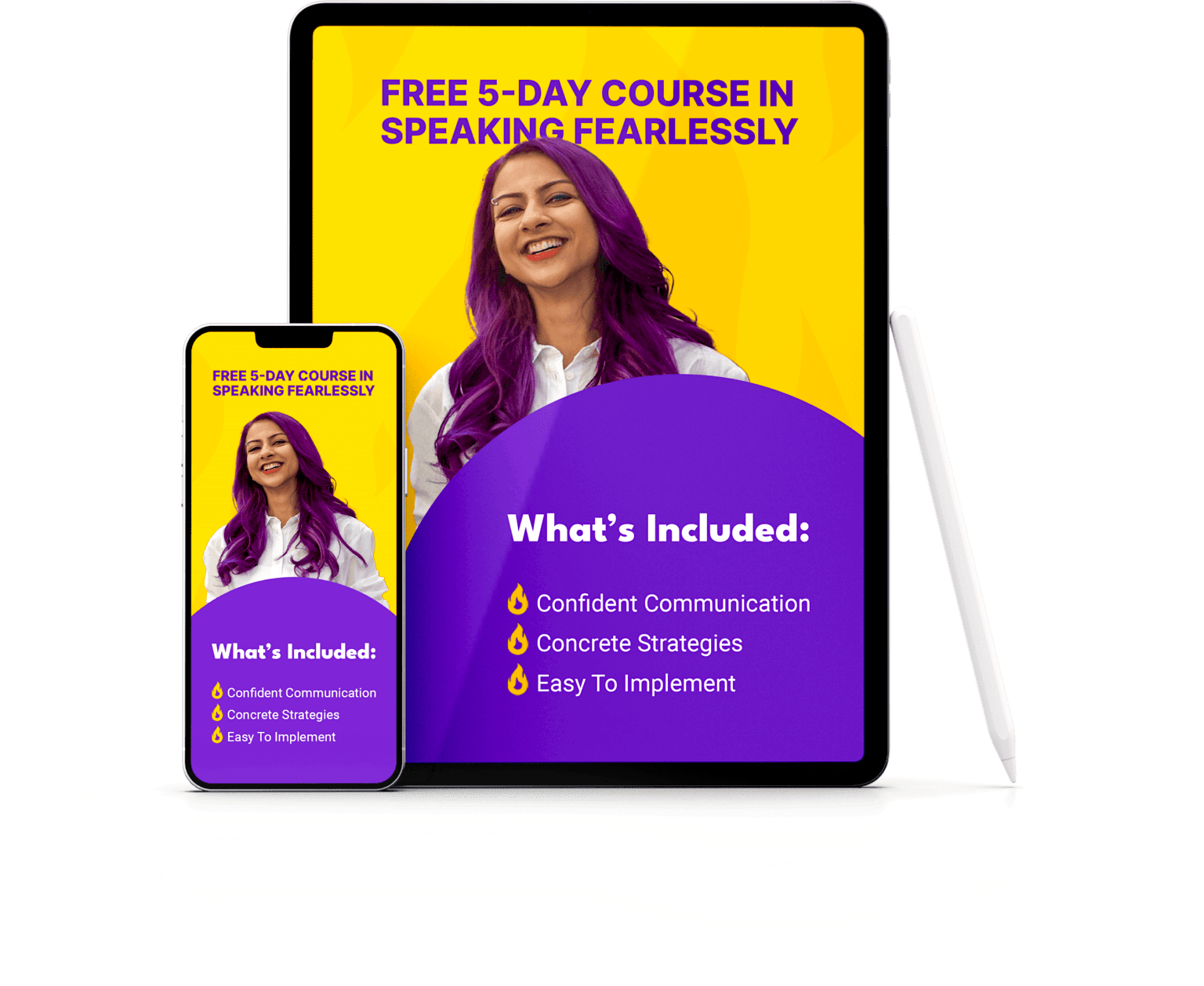Whether you’re a corporate exec, an entrepreneur or an aspiring thought leader, public speaking is a skill that can open doors to a multitude of opportunities.
It can help you advance your career, inspire change and connect with a wide audience. However, for many, the thought of standing in front of an audience can be a source of extreme anxiety and nervousness.
The fear of public speaking, known as glossophobia, affects a significant portion of the population worldwide. But the good news is that conquering nervousness and becoming a confident public speaker is entirely possible.
In this comprehensive guide, we’ll explore the psychology behind public speaking anxiety and provide actionable strategies to help you develop calm and confidence in your speaking endeavors.
Table of Contents
Understanding the Psychology of Public Speaking Anxiety
Public speaking anxiety often stems from psychological and emotional factors. Understanding the roots of this fear is the first step toward conquering it.
1. The Fear of Judgment:
One of the core psychological elements contributing to public speaking anxiety is the fear of being judged. Many individuals worry that their audience will scrutinize their every word, gesture, or mistake. This fear of judgment can be paralyzing and lead to heightened anxiety.
Spoiler alert: This fear of judgment is almost entirely ungrounded in reality – the truth is that the audience is on your side. If you do well, the audience will have invested their time wisely.
So it’ll be a win for the audience too. Very few people are there to pick your talk apart. The only hecklers I’ve ever seen are at amateur comedy shows.

2. Perceived Inadequacy:
Public speakers may feel inadequate or unprepared to address their audience effectively. This perception of inadequacy can erode confidence and intensify nervousness.
This is linked to having an imposter syndrome – some speakers, especially ones that might be doing big talks for the first time, start questioning whether they belong in the spotlight. They fear that they are ill-equipped to handle speaking to large audiences – as so far they have mostly spoken to private groups or their own teams.
The truth is – the audience doesn’t care or know whether this is your first presentation or your 1000th. They are just there to learn – and more often than not, you are in a position of knowledge and authority.

Photo by Henri Mathieu-Saint-Laurent:
3. Self-Doubt:
Self-doubt is a common psychological barrier to public speaking confidence. Many individuals question their abilities and worry about the potential for failure, which can undermine self-assurance.
While most people are confident of their knowledge – I’ve seen that a lot of new speakers aren’t sure of having the right tools to deliver their message. This makes them doubt their abilities to share that knowledge, and also makes them feel frustrated because they cannot express what they know.
4. Social Anxiety:
Public speaking is, fundamentally, a social activity. People with social anxiety may find it particularly challenging because they are predisposed to fear social interactions.
I often ask in my 1:1 client onboarding sessions – “Do you feel more comfortable speaking one-on-one or in a group?” Over 80% of my clients prefer speaking one-on-one. They feel that they are in their element and are more easily able to “be themselves” when they speak one-on-one.
But when they see videos of themselves speaking in larger groups or to a wider audience (even if it’s a perceived audience, e.g. on a podcast), they find themselves being lost. They are no longer sure that the person on the screen is the same as the one they want to project.

5. Cognitive Distortions:
Negative thought patterns, such as catastrophic thinking (imagining the worst possible outcome) or magnifying small mistakes, can contribute to heightened anxiety.
Overcoming Nervousness: Practical Strategies
Conquering nervousness in public speaking requires a multi-faceted approach that combines psychological insights with practical techniques.
The bad news is that, depending on the severity of your nerves, it might take you time to overcome them. The good news is that it’s entirely possible and I’ve guided clients to overcome and work with their nerves (instead of letting nerves control you) within weeks.
Here are strategies to help you become a calm and confident speaker:
1. Preparation is Your Superpower:
One of the most effective ways to combat anxiety is through thorough preparation. The more you know your material, the more confident you will feel. Practice your speech or presentation multiple times until you can deliver it comfortably.
A lot of people mistakenly believe that practicing your presentation will lead to a robotic, rehearsed delivery. But the truth is – if someone sounds rehearsed, they haven’t rehearsed enough to sound natural.
Prepare your presentation, talk or video to the extent where you know the material forwards and backwards. That way you can focus your attention on the audience, on your delivery and on being present in the moment. This will help combat nervousness.
- Expert Tip: Psychologist Albert Bandura’s concept of self-efficacy emphasizes the role of belief in one’s abilities. Boost your self-efficacy by mastering your material and practicing until you’re confident in your knowledge.

2. Visualize Success:
Visualization is a powerful technique. Before your presentation, close your eyes and vividly imagine yourself succeeding. Picture the audience engaged, your confidence shining, and the content flowing smoothly. This can help rewire your mind for success.
When you practice and rehearse your presentation, visualize an audience listening to you, paying attention to your every word. This has the double benefit of helping you prepare as well as give you confidence that you’ll ace the presentation.
- Expert Tip: The power of visualization is supported by psychologists like William James, who emphasized the connection between thought and action.
3. Control Your Breathing:
Breathing exercises can be invaluable in managing anxiety. Deep, diaphragmatic breaths can calm your nervous system and reduce physical symptoms of anxiety like sweaty palms or shaky hands.
I also advise my clients to create their own warmup routine leading up to an important talk or presentation.
This can include physical warmups, vocal warmups and expression warmups:
- Expert Tip: Grounded in cognitive-behavioral therapy, controlled breathing helps regulate anxiety. Psychologists like Aaron T. Beck emphasize its effectiveness in managing physiological responses to stress.
4. Reframe Negative Thoughts:
Challenge and reframe negative thoughts with positive affirmations. Instead of thinking, “I’ll embarrass myself,” replace it with, “I’m well-prepared, and I can do this.” This simple cognitive shift can significantly reduce anxiety.
You are the author of your own story: You can either choose to stay with the narrative that you’ve always used – e.g. “I’m just bad at speaking in public, I can’t do it”, or to change the narrative: “I haven’t had a chance to work on my public speaking yet – I’m going to make sure I work on it so that I can improve”.
- Expert Tip: Psychologists like Martin Seligman, known for his work on positive psychology, advocate for cultivating a positive and optimistic mindset. Affirmations can be a tool in this process.

5. Progressive Desensitization:
Gradually expose yourself to speaking situations. Start with smaller, less intimidating settings and progressively work your way up to larger audiences. Each successful experience builds your confidence.
One of the ways that I helped AI influencer Ruben Hassid speak well in public for his first international keynote speech was to have him do smaller talks at local storytelling events in Paris. Once he was exposed to a live audience, he felt more and more comfortable taking on larger audiences.

- Expert Tip: This strategy is grounded in the principles of exposure therapy, an approach endorsed by psychologists for tackling phobias and anxiety.
6. Audience Engagement:
Rather than focusing on your own anxiety, shift your attention to your audience. Engage with them by maintaining eye contact, asking questions, and involving them in your presentation. This redirection of focus can reduce self-consciousness.
Engaging the audience has a double benefit: not only do you get a chance to shift your focus from yourself to your audience, but you also get instant feedback on whether they’re paying attention or not. More often than not, I’ve seen speakers be pleasantly surprised by the level of engagement they get from an otherwise cold audience.

Photo by wes lewis on Unsplash
- Expert Tip: Renowned psychologist Mihaly Csikszentmihalyi’s concept of “flow” emphasizes the state of complete absorption in an activity. Engaging with your audience can help you enter a flow state, reducing anxiety.
7. Seek Constructive Feedback:
Solicit feedback from trusted individuals who can provide constructive criticism. Their insights can help you improve and increase your confidence.
You’d be surprised to hear how few speakers actually seek feedback from the audience – and the ones that do usually get super valuable insights that they can use to improve their talk and delivery mechanisms over time.
- Expert Tip: Feedback is a cornerstone of learning and self-improvement, as supported by the research of educational psychologists like John Hattie.
8. Professional Training:
Consider enrolling in public speaking courses or seeking the guidance of a professional public speaking coach. Expert guidance can offer personalized strategies for conquering your specific anxieties.
- Expert Tip: The role of education and coaching in skill development is highlighted by influential psychologists like Lev Vygotsky, who emphasize the importance of social learning.

Photo by Edmond Dantès
9. Know Your Audience:
Understanding your audience can greatly enhance your confidence. Tailor your speech to their interests, needs, and expectations. Knowing that your message is relevant to your listeners can boost your self-assurance.
- Expert Tip: Psychologists like Abraham Maslow’s hierarchy of needs theory can help you appreciate the importance of addressing your audience’s specific needs.
10. Practice in Diverse Settings:
Don’t limit your practice to one setting. Vary your practice locations to adapt to different environments. This can prepare you for speaking in a variety of venues.
- Expert Tip: The principle of contextual learning, supported by psychologists like Edward Tolman, emphasizes the role of environment in learning and performance.
11. Use the Power of Stories:
Stories are powerful tools for engaging an audience. Incorporate personal anecdotes or relevant stories into your presentation. Stories are relatable, memorable, and can help establish a connection with your audience.
A double benefit of storytelling is that if you tell stories from your life, you feel less anxious because you’ve already lived through them.

- Expert Tip: Narrative psychology, championed by psychologists like Jerome Bruner, underscores the role of storytelling in making sense of our experiences.
The Importance of Practice and Persistence
Overcoming nervousness in public speaking is not a one-time achievement but a skill that improves with practice and persistence. Public speaking is an art that can be mastered, and the journey to confident speaking is as important as the destination. Don’t be disheartened by occasional setbacks; they are natural steps on the path to growth.
A Final Word
Public speaking is a valuable skill that can enhance your personal and professional life.
Conquering nervousness is possible through a combination of psychological insights and practical strategies.
Remember, you have the power to transform your anxiety into confidence, one step at a time. Embrace the challenge, and you’ll find that each speaking opportunity is an opportunity for growth and self-discovery.
The journey to becoming a confident public speaker is an investment in your personal and professional development. By understanding the psychology of public speaking anxiety and applying practical strategies, you can conquer nervousness and speak with calm and confidence. Whether you’re addressing a small group or a large audience, you have the potential to inspire, educate, and make a lasting impact through your words and presence.
So, step onto that stage, share your message, and let your voice be heard.
With dedication and practice, you can become the confident speaker you aspire to be.
Want to learn how to be confident on any stage? Let’s talk.



